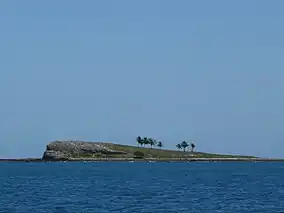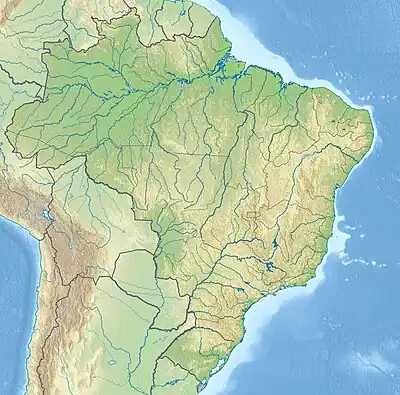Abrolhos Marine National Park
The Abrolhos Marine National Park (Portuguese: Parque Nacional Marinho dos Abrolhos [ˈpaʁki nɐsjoˈnaw mɐˈɾĩɲu duz ɐˈbɾɔʎus]) is a national park that was established in 1983 covering most of the Abrolhos Archipelago area in the state of Bahia, Brazil.
| Abrolhos Marine National Park | |
|---|---|
| Parque Nacional Marinho dos Abrolhos | |
 One of the islands of the Abrolhos Archipelago | |
 | |
| Coordinates | 17.971°S 38.700°W |
| Designation | National park |
| Designated | 2 February 2010 |
| Reference no. | 1902[1] |
Location
The park was established on 6 April 1983. It covers about 91,300 hectares (226,000 acres).[2] It became part of the Central Atlantic Forest Ecological Corridor, created in 2002.[3] It is located off the southern coast of the Bahia in the north east of Brazil.[4] The islands are volcanic in origin.[5]
There are five islands in the Abrolhos archipelago but only one of them, Siriba, is open to visitors. A 1,600 metres (5,200 ft) trail runs round this island. Ilha Santa Bárbara is outside the park boundary.[4] It is under the jurisdiction of the navy, which maintains a navigation beacon there.[2] The other islands are Ilha Guarita, Ilha Redonda, Ilha Sueste.[4] The park also includes the Parcel dos Abrolhos, where typical coral formations of the region may be seen, and the Timbebas reef opposite the city of Alcobaça.[2]
Ecology
The waters are clear and there is great diversity of underwater flora and fauna, including flourishing coral formations. The island vegetation is mainly low, small plants such as grasses and herbs. Seabirds include the white bellied booby, terns, frigates, jays and woodpeckers.[5] Charles Darwin visited the archipelago in 1830 and was impressed by the variety of species, including birds, lizards and spiders.[2]
Ilha Guarita and Ilha Sueste are home to many seabirds. Frigate birds nest on the steep sides of Ilha Redonda, which is visited by loggerhead turtles for spawning in the summer. Diving along the reefs and the Rosalinda shipwreck is allowed, and humpback whales may be observed from boats.[4] Since 2003 the park has been an outpost of the Atlantic Forest Biosphere Reserve (RBMA: Reserva de Biosfera da Mata Atlântica). In 2010 it was recognized as a Ramsar Site.[2]
References
- "Abrolhos Marine National Park". Ramsar Sites Information Service. Retrieved 25 April 2018.
- Parque Nacional Marinho dos Abrolhos – ICMBio.
- Lamas, Crepaldi & Mesquita 2015, p. 101.
- Parque Nacional Marinho dos Abrolhos – Abrolhos.net.
- The Marine National Park of Abrolhos – ilhasdeabrolhos.com.br.
Sources
- Lamas, Ivana Reis; Crepaldi, Maria Otávia; Mesquita, Carlos Alberto Bernardo (2015), Uma Rede no Corredor (PDF) (in Portuguese), Conservação Internacional (CI-Brasil), ISBN 978-85-98830-28-5, retrieved 2016-10-22
- "Parque Nacional Marinho dos Abrolhos", Abrolhos.net (in Portuguese), retrieved 2016-04-30
- Parque Nacional Marinho dos Abrolhos (in Portuguese), ICMBio, archived from the original on 2020-09-30, retrieved 2016-04-30
- "The Marine National Park of Abrolhos", ilhasdeabrolhos.com.br, archived from the original on 2016-04-06, retrieved 2016-04-30